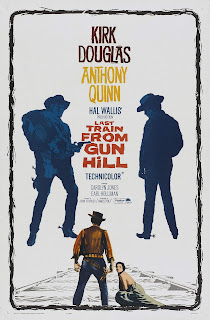The Last Train From Gun Hill
The Last Train From Gun Hill, from 1959, is a taut, well-executed Western starring Kirk Douglas and Anthony Quinn. The only thing that detracts from enjoying it is spotting how many other films it is similar to, especially Bad Day at Black Rock, which was made by the same director, John Sturges.
That film was about a lone man trying to mete justice in a town where no one would help him. That's pretty much it here. The film also has a time element, which reminds one of High Noon and 3:10 to Yuma.
Douglas plays a marshal in a small town somewhere in the West. He is married to a Cherokee woman, who is coming back from the reservation visiting relatives with their son. She is accosted by two men, who rape and murder her. They leave behind a saddle, though, and Douglas knows who it belongs to.
That would be Quinn, once his best friend, now a cattle baron who owns everything and everybody in Gun Hill. It is quickly surmised that his son (Earl Holliman) is one of the men involved, and Douglas calmly states he will take him back for trial. Quinn begs him to leave his son alone, or he will have to kill him, but Douglas is a man of principal (and it was his wife, after all), and imprisons Holliman and holes up in a hotel room until nightfall, when the last train will leave at nine.
The Last Train From Gun Hill isn't as good as any of the films I mentioned it's like, but it's fun anyway, proving one can mine a lot of Westerns out of just a few story ideas. Douglas and Quinn give fine performances, and Carolyn Jones, just a few years away from playing Morticia Addams, plays Quinn's lover, whose loyalty is tested--it seems Quinn has a thing about beating her up.
The script, by James Poe, does a nice job of getting the characters out of their predicaments. I mean, we know who will live and who will die, and when Douglas tells Holliman "I've never killed an unarmed man," he means it and won't. So the ending is very satisfactory, and the way Sturges stages the final showdown alongside the waiting train is nicely done.
This is the kind of movie that used to great to stumble across on TV on a lazy Saturday afternoon.
That film was about a lone man trying to mete justice in a town where no one would help him. That's pretty much it here. The film also has a time element, which reminds one of High Noon and 3:10 to Yuma.
Douglas plays a marshal in a small town somewhere in the West. He is married to a Cherokee woman, who is coming back from the reservation visiting relatives with their son. She is accosted by two men, who rape and murder her. They leave behind a saddle, though, and Douglas knows who it belongs to.
That would be Quinn, once his best friend, now a cattle baron who owns everything and everybody in Gun Hill. It is quickly surmised that his son (Earl Holliman) is one of the men involved, and Douglas calmly states he will take him back for trial. Quinn begs him to leave his son alone, or he will have to kill him, but Douglas is a man of principal (and it was his wife, after all), and imprisons Holliman and holes up in a hotel room until nightfall, when the last train will leave at nine.
The Last Train From Gun Hill isn't as good as any of the films I mentioned it's like, but it's fun anyway, proving one can mine a lot of Westerns out of just a few story ideas. Douglas and Quinn give fine performances, and Carolyn Jones, just a few years away from playing Morticia Addams, plays Quinn's lover, whose loyalty is tested--it seems Quinn has a thing about beating her up.
The script, by James Poe, does a nice job of getting the characters out of their predicaments. I mean, we know who will live and who will die, and when Douglas tells Holliman "I've never killed an unarmed man," he means it and won't. So the ending is very satisfactory, and the way Sturges stages the final showdown alongside the waiting train is nicely done.
This is the kind of movie that used to great to stumble across on TV on a lazy Saturday afternoon.



Comments
Post a Comment